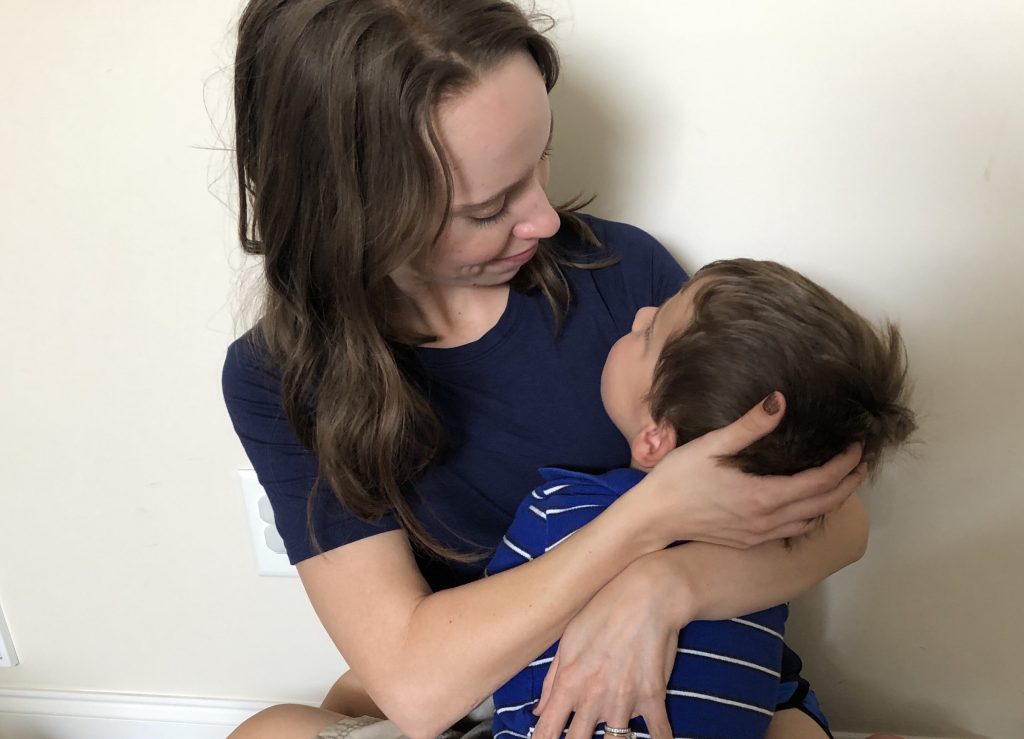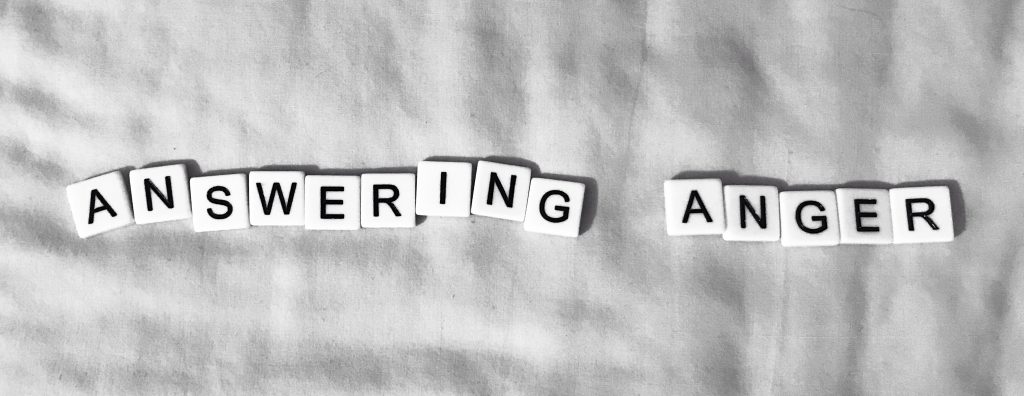“It’s okay to be angry, buddy. But it has to be for the right things and in the right way.” I was counseling my 5-year-old after he didn’t like an instruction I gave him, and he raised his fist to shake it at me.
“But who am I to teach him about anger?” I couldn’t help thinking to myself. I cannot count how many times I have lost my temper – my actions changing the look on his sweet face from laughter to fear. Sure, correction was necessary when, at 3, he dumped 80% of the new bottle of hair texturizer into the bathroom rug or, this morning, when he jumped out and screamed “BOOO!” startling me while I carried my very-full-and-now-less-full cup of coffee across the white carpet.

Did I have to yell to correct him? Are a rough voice and rough actions the only way to instruct and create change? No. Of course not. And I usually regretted my words and actions the moment they were beyond retrieval.
Why did I let my anger control me again? and how can I break this cycle?
The Opposite of Anger
As I began to consider my own anger, I considered scripture that might point me in the right direction. I knew looking for passages about “anger” would have a LOT of options to sift through including those when our sin kindles the Lord’s anger. So I asked myself, “What’s the opposite of anger?”
I started a list: peace, love, joy, forgiveness, patience, self-control, but none seems to really be the opposite of anger. Therefore, I did what anyone would do when faced with a conundrum: I posted online and asked my friends. And they came through. They confirmed many of the ideas I was tossing around. Then my cousin Nikki chimed in:
Compassion.
Looking Out
Immediately, I heard the words, “He had compassion on them” and I knew just where to turn my concordance: Compassion.
Anger looks inward. When I get (selfishly) angry, my focus is almost always on how another person or circumstance is affecting me. Compassion looks outward. Compassion looks to understand what is going on in someone else’s life and why they are behaving this way.

Sometimes when my child behaves selfishly or even meanly, it’s his way of communicating to me that something is wrong. When I find myself getting annoyed (because let’s be honest, anger is usually the eruption after prolonged annoyance), I need to pause and look at the other person.
There are many times in scripture that Jesus had compassion on people, and it almost always moved him to action. He didn’t see us hurting and keep going.
God Who Sees
In Matthew 20 Jesus is leaving Jericho. This is the passage that comes just before the Triumphal entry. I can’t help but think Jesus probably had a lot on his mind – maybe even retreating into his own thoughts. There was a large crowd following him and two blind men sitting by the road. When they realized Jesus was passing, they cried out “Lord, have mercy on us, Son of David!”
The crowd told them to be quiet. Not to bother this important man. But they just got louder.
Jesus stopped and asked “What do you want me to do for you?”
“Lord, open our eyes.”
And then we see it: “Moved with compassion, Jesus touched their eyes. Immediately they could see and followed him.” (Matthew 20: 34)
I can picture it all so clearly. I’m busy doing something important. I do not have time for the 37 “Mom!”-s that keep interrupting me. Then comes the crash. I see the mess. The heat rises into my face. I open my mouth but before the words come out, I see the child. His face looks at me so earnestly that I swallow the scream and pick him up. “Hey, Buddy. Let’s talk.”

When Jesus saw the men, he was moved with compassion. He stopped his very important journey to make people important.
He looks on his children with compassion. Shouldn’t I do the same?
Instead of the mess, see the child.
Instead of the task interrupted, look for the interrupter’s need.
Defining the Need
Sometimes anger is justified. Sometimes my child absolutely deserves the punishment he receives. But when I act like a pressure valve releasing steam, it is not discipline, it’s sin. Discipline should correct his behavior, not make me feel better.
As my frustrations rise, I have to look at my child and access the situation. Has he ever experienced this circumstance before to know how to respond? Have I prepared him for how to process what he’s going though? Is he willfully choosing to disobey a known command? Is he overwhelmed?
You don’t punish a child learning to walk for falling down. Children are not born knowing how to respond to and behave in every situation. You don’t punish them for that; you have to teach them.
And sometimes a child who knows exactly how to behave will use bad behavior to demonstrate to you that he’s overwhelmed. Just like you “letting off steam” (cough… gossiping… cough cough) to a coworker or grumbling under your breath as you walk away from dealing with a difficult person. The child here is wrong and needs correction, but more importantly, he needs compassion.
Compassion doesn’t just address the annoyance; it goes behind the annoyance to find the needs and seeks to make it right — to heal.
Pause.
My dear brothers and sisters, understand this: Everyone should be quick to listen, slow to speak, and slow to anger,
James 1:19
My biggest defense to anger is to pause. Pausing allows me to look at my child instead of my feelings. It reminds me that his behavior is an opportunity to teach and help.

Compassion and healing are a picture of Christ’s love for me.
My child needs to see that picture.
Truthfully Yours,
DB
P.S. We all mess up. Don’t suffer under shame. Check out Redeeming Regret.
This is beautifully written. My daughter is a first-time mom with a three month little old boy. I have been having an ongoing conversation with her about this very subject. This will help to convey the message I’m trying to provide.
Miss seeing you two.
Really loved and needed this today.. Especially liked:
Love loved and needed this today! Especially liked: “You don’t punish a child learning to walk for falling down. Children are not born knowing how to respond to and behave in every situation. You don’t punish them for that; you have to teach them.”
It’s such a powerful thought! I have to stop myself a lot when my oldest says something disrespectful and ask, “Does he know he is being disrespectful? Is he repeating something he has heard but doesn’t understand?”
Love this, Dani. I feel like God is constantly using parenting to teach me about my relationship with Him. What a loving Father we have!!